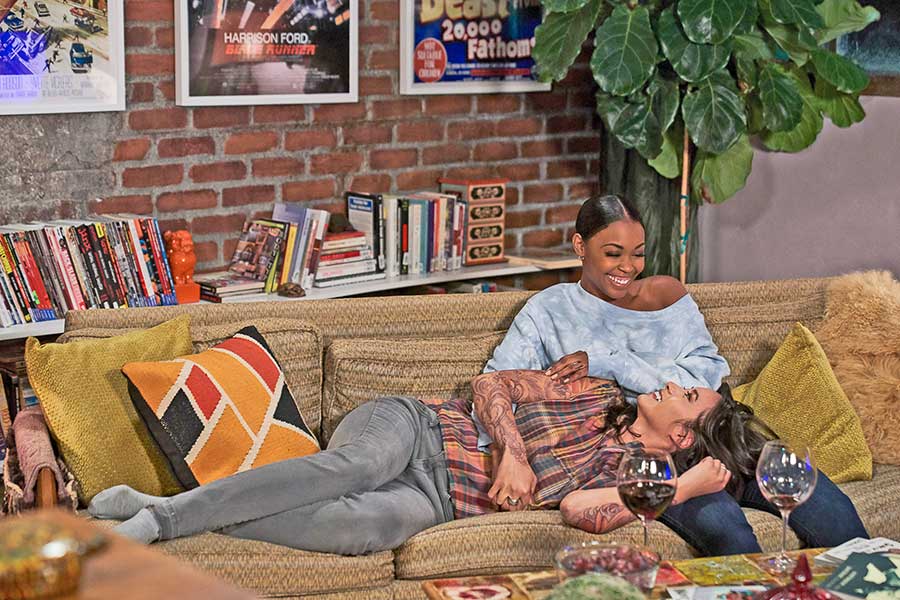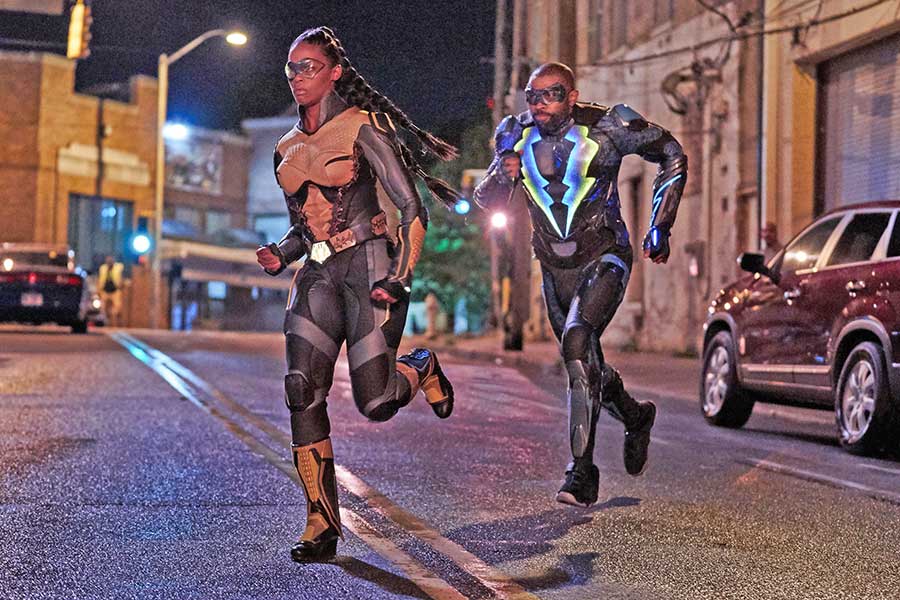
Nafessa Williams is taking her role as Thunder, the first black lesbian superhero character on television, to heart for the second season of “Black Lightning.”
Williams plays the openly gay eldest daughter, Anissa. Much to the chagrin of her worried parents, Anissa as Thunder fights crime with her special power of increasing her density to render herself immovable and bulletproof.
Williams, who identifies as a straight LGBT ally, said she takes the responsibility of playing TV’s first African-American lesbian superhero very seriously. “It was not just another acting gig,” she said about landing the role of Thunder. “When I first went out for it, I didn’t know it was a superhero show until my final audition. I just saw the character. She was a strong, bold activist who unapologetically lived her life. That was the breakdown of who she was.
“I had never heard of Black Lightning prior to this, so it took some research. I went back and dug up the old comic books from 1977 to research it,” Williams said.
“I wasn’t worried about the pressure of playing a lesbian character and representing the LGBTQ community, and an African-American lesbian character on top of that. I just figured I’d do what I do with all my characters. I go into them. I don’t judge them. I remember telling myself when you go into this, don’t even think about it as ‘she’s a lesbian.’ Just think about the foundation of love and make sure you bring that to the character and you won’t have to worry.”
This year critics of the show have taken notice of the role as the series and its representation of LGBTQ characters as it has been nominated for 2019 GLAAD Media Award for Best Drama Series.
“Black Lightning” is based on the African American superhero DC Comics debuted in 1977. The main character has a number of abilities related to generating and manipulating electricity.
In the TV series, the title character had semi-retired from fighting crime at the behest of his wife to focus on being a family man (and not almost getting killed every week) in the fictional city of Freeland. Years after he hung up his costume, he’s forced to put it back on after a local crime gang threatens the lives of his daughters, who also end up having powers.
Williams, a Philly native, said that besides representing the LGBTQ community on screen, she has taken to being what she called “a comic-book geek.”
“When you’re playing a character and there’s tangible research out there, you kind of lose yourself in it, and you’re grateful for it, that you can build this character off of research and information that is already out there,” she said. “I’ve always wanted to play a superhero. I was physically getting my body ready to play a superhero. I just didn’t know it was going to come in the form of the first black lesbian superhero.”
Since the series started, Thunder has become the more revolutionary of the heroes on the show. In the first season, we learned the children of Freeland were subjected to years of experiments by a shadowy agency that resulted in many children getting superpowers and then disappearing. Corruption in the government and the police force are also major plot points in the series. This leads to a clash in philosophies between Black Lightning and Thunder, with the former wanting to work within the system to fix these injustices while the latter wants to take a more-direct vigilante route.
Williams said she enjoys portraying a strong, radical character.
“What’s cool is that I love that about her. That is who Thunder is, what she stands for. I love that she’s so deviant. She’s like, ‘This is not working this way. You raised me to follow these rules, but I’m an adult and this is how I feel and I’m going to take matters in my own hands.’ I love, love, love that about her. She’s always had that about her since the first season.”
Williams said she definitely believes there’s an obvious arc to her character. Thunder has become smarter and sharper and has grown as a superhero, even if her parents still question some of her decisions.
CW, the network that produces “Black Lighting,” also produces other superhero TV shows such as “The Flash,” “Supergirl” and “Arrow.” Most of those shows exist in their own realities that sometimes cross over for special story events each season. “Black Lighting,” so far, has been in its own universe and hasn’t encountered the other heroes, but sooner or later they’re going to meet up in one or more of the other shows.
Williams said she welcomes the collaboration.
“I think the future is female,” she said. “I’m always down for teaming up with Supergirl. And I hear that Batwoman is coming. So I think that would be great for me to team up with the other super, badass women on the CW and fight crime together.”
Until she fights alongside (or against) Supergirl and Batwoman, Williams is focused on being part of a show that is important to fans who aren’t used to seeing themselves in that light.
“We’ve been getting really good feedback, and it’s been really cool and rewarding as an artist to know that you’re being effective. And to know that we are inspiring, and giving the culture something they’ve never seen before. In particular for me, knowing that I’m inspiring a generation of young black lesbians and lesbians as a whole who watch our show and feel normal after seeing it.”
“I went to ClexaCon, which is a comic convention for the LGBTQ community, and there was a young woman who was about 16. And she was in tears when she came up to me. She hugged me and said, ‘Thank you so much because after seeing Thunder, I feel normal being a lesbian now and I didn’t prior to seeing the show.’ So those are the experiences and encounters that make me feel like I’m truly doing my job and being an inspiration.”
“Black Lightning” airs on the CW at 9 p.m. Mondays. For more information, visit https://www.cwtv.com/shows/black-lightning.

